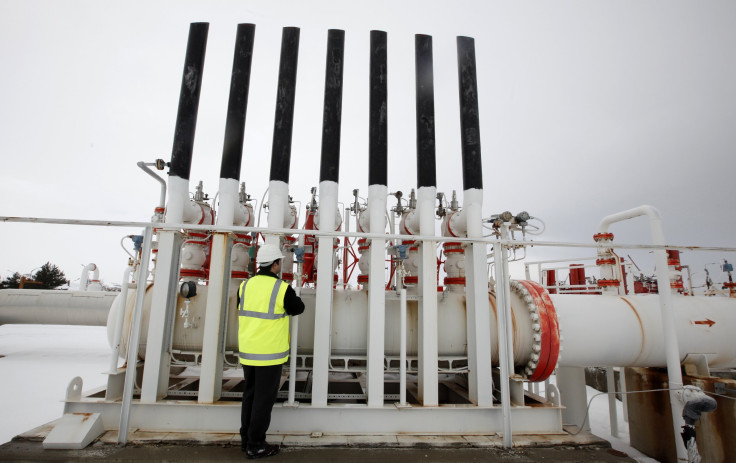As EU Looks For Alternatives To Russian Gas, Turkey Vacillates Between East And West

ISTANBUL -- As European leaders cast a wary eye toward Russia, which could choke the flow of energy heading their way as a tactic in its conflict with Ukraine, they are increasingly viewing Turkey as a vital alternative source.
A simple look at a globe makes the point. Turkey sits directly between the vast oil fields of the Middle East and the voracious industrial energy markets of Germany, France and Italy, forming a southern land bridge that connects Europe and Asia.
Yet just as Europe eyes Turkey as a potential means of reducing its dependence on Russian energy, fresh geopolitical developments have caused Turkey to re-evaluate its relationships with Europe and Russia. Though Turkey has tried to enter the European Union, Turkish Prime Minister Recep Tayyip Erdogan has cracked down on dissenters opposing his rule and revealed an affinity with Russian President Vladimir Putin, himself a skilled practitioner in the dark arts of maintaining rule through force. The latter could make Turkey more circumspect about its relationship with the West -- and more likely to side with Russia than Europe as hostilities in the region evolve.
“Turkey would like to see itself as a bridge between Russia and the West,” said Talip Kucukcan, the director of foreign policy research at the Foundation for Political, Economic and Social Research in Istanbul. “Turkish decision-makers are no longer 100 percent following Western principles or principles that have been put forward by other countries. Turkey would like to see its own policy.”
Critics in Turkey claim that Erdogan admires Russian President Vladimir Putin’s authoritarian and socially conservative style and wants to replicate it both at home and abroad. “There are similarities between Putin and Erdogan, which have resulted in good personal relations between them,” said Dimitar Bechev, a senior fellow at the European Council on Foreign Relations. “While it is extreme to say that Erdogan is a copy of Putin, as some people do, the fact is that they have good personal rapport.”

Erdogan is cognizant that his energy assets are more strategically valuable than ever -- a realization he has parlayed into lucrative deal-making with Russia.
Though Turkey imports some 90 percent of the oil and gas it uses, it could be a potential energy exporter if Russia disrupts natural gas deliveries to several European Union members, which could happen as early as next month. Moscow has threatened to tighten deliveries to Ukraine beginning in June if Kiev doesn’t start paying its $3.5 billion gas bill.
“It seems unlikely that the arrears will be paid in full by the end of May,” said Laurent Ruseckas, a senior Eurasian oil and gas expert at London-based IHS, a global information company. “If Russia stops deliveries to Ukraine, it is likely that the Ukrainians would take out some gas from deliveries to the West anyway, and that would mean a reduction of flows.”
Like Europe, Turkey would be directly affected by such a crisis, because it imports some of its gas through Ukraine, though it is in a far better position than its European neighbors as it's developed alternate energy routes from Russia and alternate sources, including Azerbaijan, Iran and Iraqi Kurdistan. As a result, Turkey could increase its exports to the EU despite the fact that it imports the majority of its own oil and gas.
Turkey and Russia have recently signed several important energy deals, including one for expanding the capacity of the Blue Stream gas pipeline under the Black Sea, and Turkey has suggested that it would allow Russia to build the proposed South Stream, a controversial pipeline designed to bypass Ukraine, on its own territory if the European Union blocks the project.
Still, Russia is sanguine about Turkey’s potential for influencing its energy leverage over Europe.
Experts say the Kremlin is particularly concerned about the so-called Trans-Anatolian gas pipeline (TANAP), which is scheduled to begin carrying gas from Azerbaijan to Turkey in 2018 -- and, soon afterward, via extensions, to Europe.
“Russia is very worried by the TANAP pipeline,” said Victor Mizin, vice president of the Center for Strategic Assessments in Moscow. “They see it as an anti-Russian ploy that is in competition with South Stream.”
As currently planned, TANAP is a fairly modest venture, designed to carry about a quarter of the gas that South Stream would, and much of that would stay in Turkey. But the rivalry could intensify if abundant sources of gas and oil, such as Iran's, join the project, said William Hale, professor emeritus of Turkish and Middle Eastern politics at the School of Oriental and African Studies in London, who now lives in Istanbul.
“While Azerbaijan doesn’t have the amounts of gas that Europe needs, Iran has the world’s second biggest natural gas reserves after Russia,” Hale said. “The Europeans could replace Russian gas with Iranian gas -- or maybe even a combination of Iranian gas and Iraqi gas.”
That scenario would require Iran to resolve its nuclear issue with the UN, which would then lift its sanctions on the country and allow renewed international investments in Iran's underdeveloped gas fields, which is where Russia could easily interfere. “The Russians have got every interest in supporting the hardliners in Iran to prevent the deal over the nuclear program,” Hale said.
Ruseckas predicted that the nuclear deal “more likely than not” will happen, but he said the distances involved would make Iranian gas expensive and unattractive to Europe.
© Copyright IBTimes 2024. All rights reserved.











